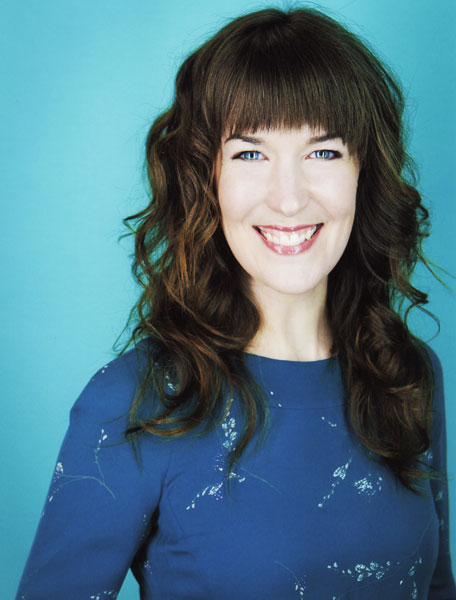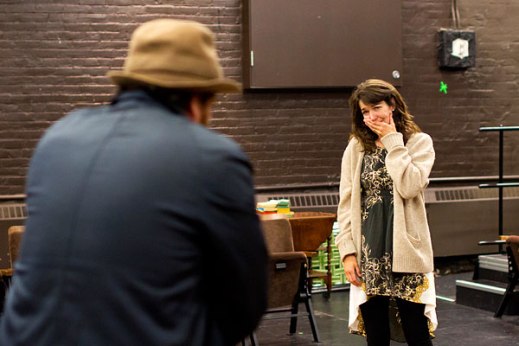Conquering The Norman Conquests – Laura Condlln
Actor Laura Condlln reflects on the unique challenges of rehearsing Alan Ayckbourn’s trilogy of plays.
 6 actors
6 actors
3 stage mangers
3 designers
1 director
3 plays
6 weeks
The initial feeling of being confronted by three plays, albeit playing the same characters but still THREE plays, taking place over three days, in three different locales was most certainly daunting. It seemed an impossible task to accomplish – an enormous mountain to climb – and yet a thrilling challenge to undertake.
The Norman Conquests, by Alan Ayckbourn, is a trilogy composed of Table Manners, Living Together and Round and Round the Garden. The action covers a traumatic family weekend in rural Sussex. Each play views the events of the weekend from a different vantage point: the dining room, living room and garden. The three plays work marvellously together in repertory, but are, in essence, independent of each other and with distinct rhythms of their own. They can be seen in any order and not necessarily with either of the other two plays, though the umbrella title for the trilogy seems to be a means of emphasizing to an audience they should see all three.
The genesis of the plays, as I understand it, is that they were all written simultaneously over a week in May of 1973.
A week.
Are you kidding me? It takes me a week to write my grocery list.
Ayckbourn was writing the project for a specific company in England. A neat little anecdote I read to explain why the character of Norman appears so late in Table Manners (the first of the plays to be rehearsed with that company), was simply because the actor playing Norman was unavailable for the first week of rehearsals so the script was written to accommodate this. Ayckbourn wrote each play in chronological cross sections, first writing Scene One of each, and then Scene Two, and so on. Each play has two acts and four scenes. How he wrapped his brain around it is beyond me. But the result is genius.
One is immediately impressed by the technical ingenuity of the writing, the cleverness and brilliant hilarity of it all, but as familiarity increases and you delve deeper into the material, one discovers that beneath the surface lies a complex portrait of emotional chaos. It’s a comedy, yes – some even call it a sex farce – but however much we laugh, the plays, which have been said to have a Chekhovian undercurrent, deal with loneliness, familial tensions, thwarted lust and the explosive potential of irritable and dissatisfied people in very close quarters.
Sounds hilarious…
But in the theatre, deeply unhappy people can generate profound happiness in audiences allowed to eavesdrop on their lives.
Making a play come to life is a wonderful challenge, and one I have loved for a long time. The rehearsal process is my favourite part of the journey. I love trying to figure it all out. While building a character I use a collage of techniques I’ve foraged along the way and welcome any bit of inspiration to help make the portrait of my character become clear and specific. Outside of the play itself, I look to books and articles, to music and interviews and podcasts, to film and TV for anything that’s useful and informative. Lately, I’ve been devouring episodes of 1970s British TV- The Good Life and As Time Goes By. It’s super, and really helpful. Then, in the rehearsal hall, I am constantly making discoveries as I play with, and am inspired by scene partners, and guided by the director. Together we figure out how and where we all fit into the world of the play. This particular process was very unique: Following our playwright’s lead, we began by abandoning his format, and examined the arc of the weekend’s events in chronological order. This meant that we pulled the plays apart and worked on them out of sequence. We are now reassembling the plays in their proper sequence and discovering the spirit and rhythm of each one. And reaffirming that while they are absurd and comedic, they are at the same time remarkably human and domestic.
The spoken word is the engine for the entire piece, and full of clues for character and relationships. We spend hours poring over our scripts working to embrace the British sound, sensibility and brilliant wit of the language. And frankly, there is SO MUCH to learn! My days have a familiar easy pattern:
Wake up-learn lines.
Rehearse- try to remember lines.
Come home- learn lines.
Sleep- dream about lines.
Repeat.
But what a gift to speak this dialogue, so the work is very rewarding.
And, as always, it’s the people you’re with who make the experience extra-ordinary. There is a miraculous alchemy that happens in a rehearsal hall. We come together as a disparate group of humans and before you know it, we’re thinking like a family, squabbling like siblings, fighting like husbands and wives and rolling on the floor kissing someone you just met a few weeks ago.
I feel so lucky to be working with this group of artists. We are united by Ayckbourn’s gorgeous and witty words, and the room is full of warm generosity, boundless creativity, naughty humour and humble humanity. And above all, full of laughter – joyful guffaws in fact, to quote Norman himself.
Two weeks to go…
Artist headshot supplied. Rehearsal photo by Nathan Kelly
